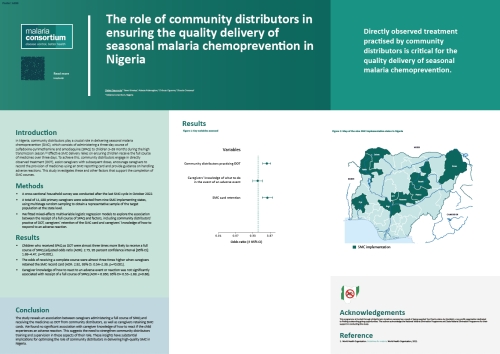
Publication Date:
20/10/2023
Author:
Olabisi Ogunmola
Taiwo Ibinaiye
Adaeze Aidenagbon
Chibuzo Oguoma
Olusola Oresanya
Type:
Poster

The role of community distributors in ensuring the quality delivery of seasonal malaria chemoprevention in Nigeria
Publication Date:20/10/2023
Author:
Olabisi Ogunmola
Taiwo Ibinaiye
Adaeze Aidenagbon
Chibuzo Oguoma
Olusola Oresanya
Type:
Poster
Directly observed treatment practised by community distributors is critical for the quality delivery of seasonal malaria chemoprevention.
In Nigeria, community distributors play a crucial role in delivering seasonal malaria chemoprevention (SMC), which consists of administering a three-day course of sulfadoxine-pyrimethamine and amodiaquine (SPAQ) to children 3–59 months during the high transmission season. Effective SMC delivery relies on ensuring children receive the full course of medicines over three days. To achieve this, community distributors engage in directly observed treatment (DOT), assist caregivers with subsequent doses, encourage caregivers to record the provision of medicines using an SMC reporting card and provide guidance on handling adverse reactions. This study investigates these and other factors that support the completion of SMC courses.
This poster was presented at the 72nd annual meeting of the American Society of Tropical Medicine and Hygiene.
Country: Nigeria
Keywords: ASTMH | Community delivery | SMC
« Back to Publications